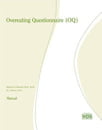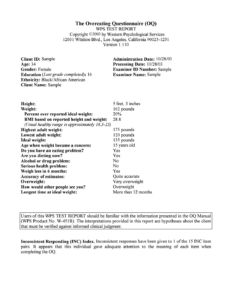
Overeating Questionnaire oq
For: Measures key habits, thoughts, and attitudes related to obesity, allowing clinicians to design individualised weight-loss programs
Reading Level: 9 to 98 years
Format: Paper-and-Pencil, PC Based Software
Length: 20 minutes
Scoring: Hand Scored; Computer Scored
Printed Kits
Click to browse products
Printed Forms & Handscoring Materials
Test forms, response booklets and scoring reference manuals.
PC Software
Click to browse products
OQ Kit
OQ AutoScore Answer Sheet (25)
OQ 25-Use Scoring CD
OQ PC Answer Sheet (Pad of 100 sheets)
Sample Reports
Authors
William E. O’Donnell, Ph.D., MPH and W. L. Warren, Ph.D.
Description
Recent surveys indicate that nearly half of all American children are overweight. Whilst most instruments related to eating behaviour focus on bulimia and anorexia, the Overeating Questionnaire (OQ) measures key habits, thoughts and attitudes related to obesity. Appropriate for individuals as young as 9 years of age, it may be extremely helpful in designing effective individualised weight-reduction programs.
The OQ is an 80-item self-report questionnaire that may be group or individually administered in about 20 minutes. (Items are written at a fourth-grade reading level.) It yields the following scores:
Overeating Health Habits
Under-eating Body Image
Craving Social Isolation
Expectations About Eating Affective Disturbance
Rationalisations Motivation to Lose Weight
The first six scores relate to eating habits and attitudes, while the last four help identify problems that may need to be addressed concurrently with obesity. Two additional scores (Inconsistent Responding and Defensiveness) assess response bias. Norms are based on a nationally representative sample of 1,788 individuals aged 9 to 98 years.
Clients trust a treatment plan based on scientifically valid and defensible evidence
OQ scores correlate with other measures of eating-related characteristics, body mass index, health habits, mood disturbance, social functioning and successful engagement in weight-loss activities. Information generated by the OQ is invaluable in planning effective individualised weight-loss programs. Because the test may be administered and scored by any trained and supervised technician, it is a practical and cost-effective addition to any treatment effort focused on weight loss and related psychological problems.
OQ Case Study: Michael
Michael seems to passively accept his weight gain. What’s behind his apparent apathy? Michael is a 138-pound, 11-year-old boy whose weight problem has escalated alarmingly over the past 2 years. He believes that obesity “runs in the family.” His mother has observed that he has been “moodier than usual” lately.
Michael’s paediatrician referred him to a weight-loss program for preteens. There he took the Overeating Questionnaire as part of a routine intake procedure.
Michael’s high scores on the “Rationalisation” and “Affective Disturbance” scales suggest that he attributes his weight to factors other than his own behaviour and that mood disturbances divert his attention and energy away from his weight-loss efforts. His high score on the “Motivation to Lose Weight” scale indicates that apathy is not to blame.
The most important insight Michael’s counsellor took away from the OQ profile is that Michael’s eating habits are closely tied to his moods. Michael eats to alleviate stress and loneliness. This knowledge allowed his counsellor to design a plan that addresses Michael’s emotional issues, encourages him to find diversions that will help him control his emotional overeating, and teaches him to assume responsibility for whatever successes or failures he may encounter in his effort to shed pounds.
NB: Prices are in Australian dollars inclusive of GST. NZ customers need to log in to view ex-GST prices.




